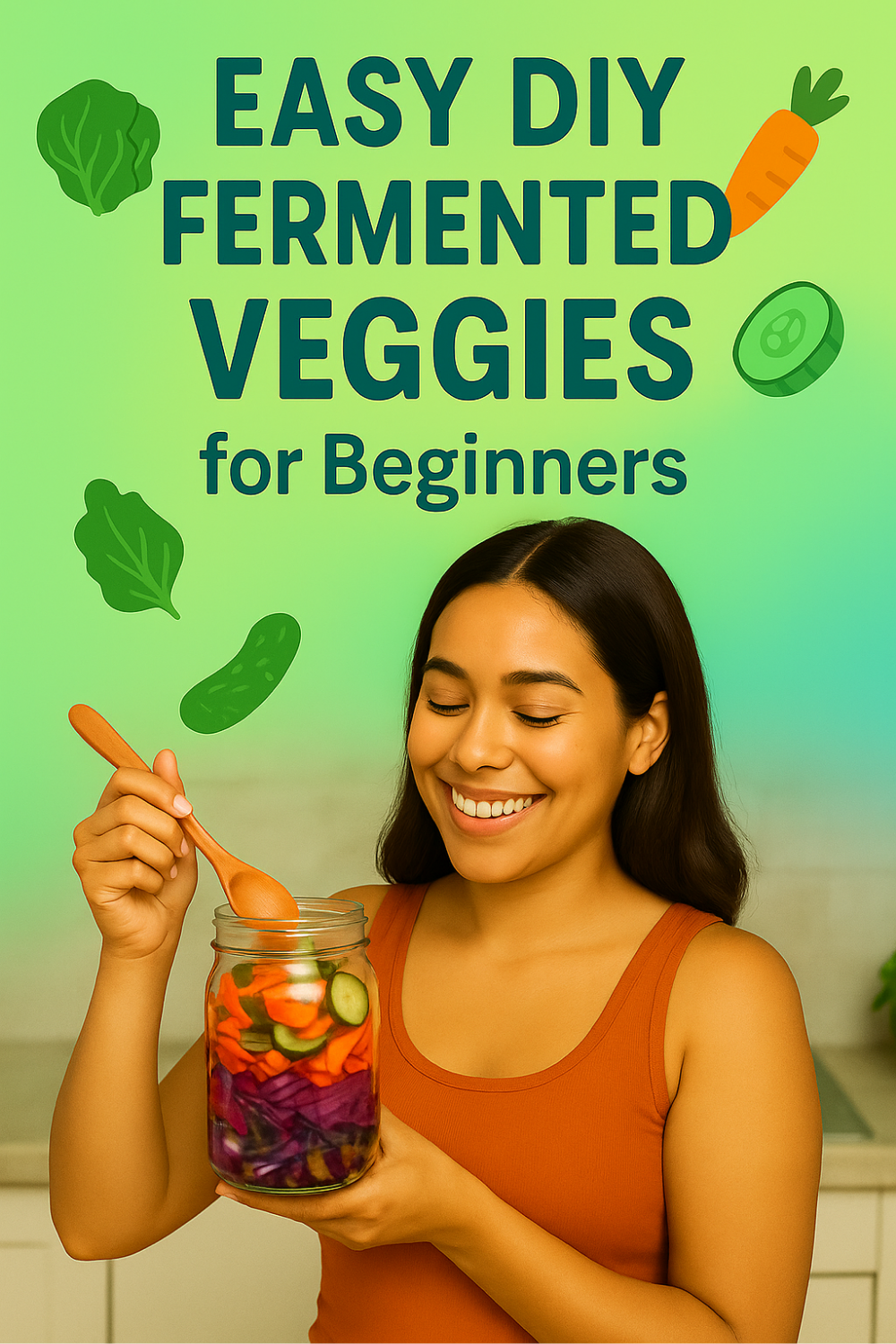Fermented veggies are a simple, tasty, and effective way to naturally boost your wellness and digestion at home. Fermentation clearly enhances the nutritional value of vegetables, supports your gut health, and provides beneficial probiotics. Making your own fermented veggies is surprisingly easy, budget-friendly, and allows you to customize flavors to suit your taste preferences. In this beginner-friendly guide, you’ll clearly learn the basics of vegetable fermentation, understand the incredible health benefits, and discover easy step-by-step recipes to start fermenting your own veggies today.

- What is Vegetable Fermentation?
- Benefits of Eating Fermented Veggies Regularly
- Essential Tools for Home Fermentation
- Best Veggies to Ferment for Beginners
- Step-by-Step Guide to Easy Fermented Veggies
- Simple and Delicious Fermentation Recipes
- Common Fermentation Mistakes and How to Avoid Them
- How to Safely Store and Enjoy Your Ferments
- Tips for Successful Fermentation at Home
- Incorporating Fermented Veggies into Daily Meals
What is Vegetable Fermentation?
Vegetable fermentation is an ancient food preservation method that involves naturally occurring beneficial bacteria converting sugars into healthy probiotics. This process clearly enhances nutrition, improves digestibility, and creates flavorful, gut-supporting foods. Popular fermented veggies include sauerkraut, kimchi, and fermented pickles.
Benefits of Eating Fermented Veggies Regularly
Regularly enjoying fermented veggies offers significant wellness benefits:
- Improved Digestion: Clearly supports gut health, reduces bloating, and improves digestion.
- Enhanced Immunity: Clearly strengthens your immune system through probiotics.
- Better Nutrient Absorption: Clearly increases the bioavailability of vitamins and minerals.
- Balanced Gut Microbiome: Clearly maintains beneficial gut bacteria.
- Reduced Inflammation: Clearly lowers inflammation in the digestive tract.
Clearly, fermented veggies enhance overall health naturally.
Essential Tools for Home Fermentation
Clearly set yourself up for easy fermentation success with:
- Glass Mason Jars: Ideal for safely fermenting veggies.
- Fermentation Weights: Keeps veggies submerged below brine.
- Salt: Non-iodized sea salt or kosher salt for safe fermenting.
- Filtered Water: Free from chlorine to support beneficial bacteria.
- Fermentation Lids: Allows gas to escape while preventing contamination.
Clearly gathering these essentials ensures easy fermentation.
Best Veggies to Ferment for Beginners
Clearly start fermenting easily with these veggies:
- Cabbage: Perfect for sauerkraut.
- Carrots: Crunchy and tasty fermented snacks.
- Cucumbers: Easy fermented pickles.
- Radishes: Quick ferment, tangy flavor.
- Cauliflower: Great texture and flavor absorption.
Clearly, these veggies offer successful beginner-friendly fermentation.
Step-by-Step Guide to Easy Fermented Veggies
Clearly ferment veggies successfully with this simple method:
Step 1: Choose and Prepare Veggies
Clean veggies thoroughly and chop or slice into consistent sizes.
Step 2: Prepare Brine
Dissolve 1–2 tablespoons non-iodized salt per quart of filtered water.
Step 3: Pack Jars
Pack veggies tightly into clean jars, leaving a little space at the top.
Step 4: Add Brine and Weight
Pour brine over veggies until fully submerged. Place fermentation weight to keep veggies under brine.
Step 5: Seal and Ferment
Secure lids loosely or use fermentation lids. Store jars at room temperature for 5–14 days.
Step 6: Taste and Store
Check regularly, taste daily after the fifth day. Refrigerate when desired flavor achieved.
Simple and Delicious Fermentation Recipes
Easy Homemade Sauerkraut
- Thinly sliced cabbage, 1 tablespoon salt per small cabbage head. Ferment 7–14 days.
Quick Fermented Carrots
- Carrot sticks, garlic cloves, dill, brine solution. Ferment 5–7 days.
Beginner-Friendly Pickles
- Small cucumbers, dill, garlic, brine solution. Ferment 5–10 days.
Clearly these recipes provide delicious, nutritious results.
Common Fermentation Mistakes and How to Avoid Them
Clearly avoid common beginner pitfalls:
- Veggies Not Submerged: Use fermentation weights to prevent spoilage.
- Using Chlorinated Water: Always use filtered water to support probiotics.
- Too Much Salt: Stick to recommended salt amounts to prevent overly salty ferments.
- Contamination: Always start with clean jars and utensils to avoid unwanted bacteria.
- Inconsistent Temperatures: Ferment in a consistently cool, room-temperature area.
Clearly avoiding these mistakes ensures safe, tasty fermentation results.
How to Safely Store and Enjoy Your Ferments
Clearly store fermented veggies properly:
- Refrigerate after fermentation to halt further fermentation and maintain freshness.
- Consume regularly to enjoy probiotic benefits consistently.
- Keep veggies submerged in brine when storing to extend shelf-life.
Clearly safe storage enhances your fermented veggie experience.
Tips for Successful Fermentation at Home
Clearly maximize success with these simple tips:
- Start Small: Begin with small batches until comfortable.
- Monitor Daily: Check and taste regularly to achieve ideal flavors.
- Experiment with Flavors: Add herbs, spices, or garlic to enhance taste.
- Use Fresh Veggies: Ensure veggies are fresh for best texture and flavor.
- Label Clearly: Date jars clearly to track fermentation progress.
Clearly following these tips ensures enjoyable fermentation experiences.
Incorporating Fermented Veggies into Daily Meals
Clearly enjoy fermented veggies easily in daily meals:
- Add sauerkraut or kimchi to salads and sandwiches.
- Top rice bowls or tacos with tangy fermented veggies.
- Enjoy fermented pickles as flavorful snacks.
- Mix into grain bowls or veggie dishes for probiotic boosts.
Clearly regular inclusion enhances daily nutritional value effortlessly.
Frequently Asked Questions
Are homemade fermented veggies safe?
Yes—when using proper hygiene, salt ratios, and storage methods, homemade ferments are safe and nutritious.
How soon can I start eating fermented veggies?
Usually within 5–7 days, though taste regularly to determine your preferred flavor and texture.
Can I ferment veggies without salt?
Salt is critical to prevent harmful bacteria. Stick to recommended amounts to ensure safe fermenting.
Do fermented veggies need refrigeration?
Yes, refrigeration slows fermentation and preserves flavor and safety once the desired taste is reached.
How long do fermented veggies last?
Properly refrigerated, fermented veggies last several months, maintaining freshness and probiotics.